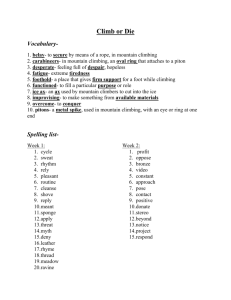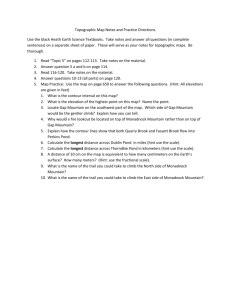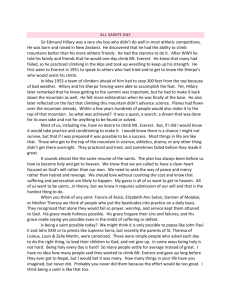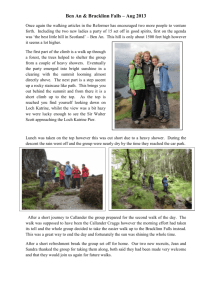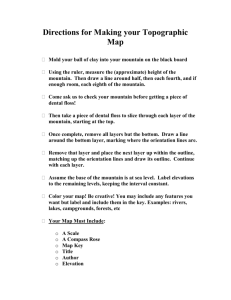Role Model - Omnifitness Inc
advertisement
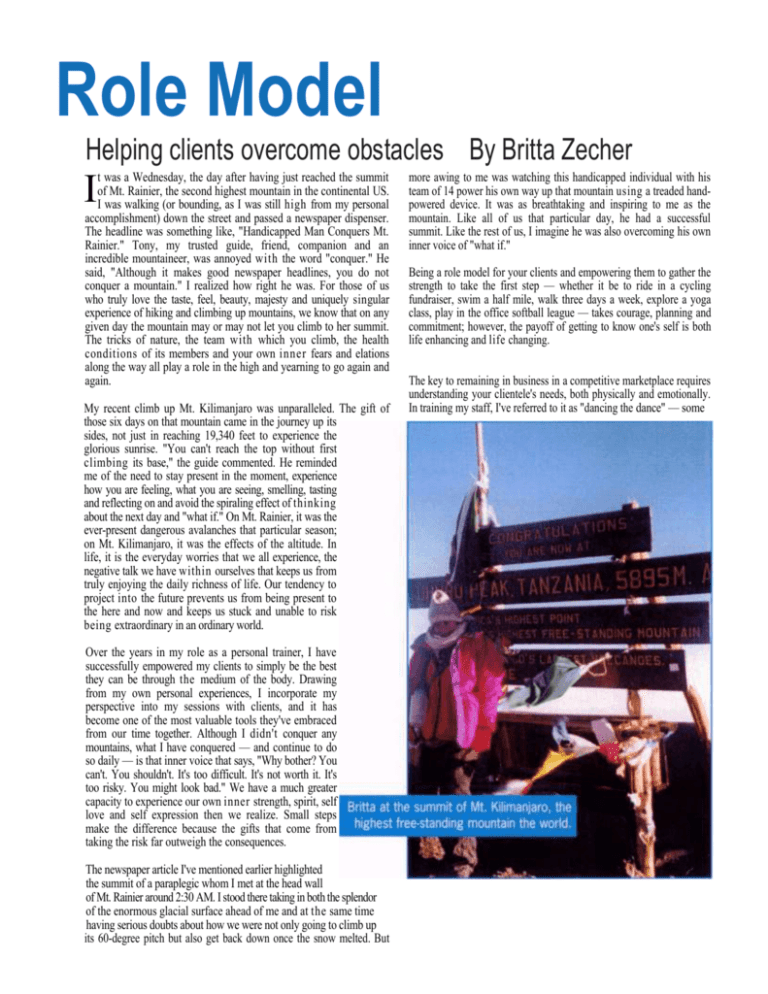
Role Model Helping clients overcome obstacles By Britta Zecher t was a Wednesday, the day after having just reached the summit of Mt. Rainier, the second highest mountain in the continental US. I was walking (or bounding, as I was still high from my personal accomplishment) down the street and passed a newspaper dispenser. The headline was something like, "Handicapped Man Conquers Mt. Rainier." Tony, my trusted guide, friend, companion and an incredible mountaineer, was annoyed with the word "conquer." He said, "Although it makes good newspaper headlines, you do not conquer a mountain." I realized how right he was. For those of us who truly love the taste, feel, beauty, majesty and uniquely singular experience of hiking and climbing up mountains, we know that on any given day the mountain may or may not let you climb to her summit. The tricks of nature, the team with which you climb, the health conditions of its members and your own inner fears and elations along the way all play a role in the high and yearning to go again and again. I My recent climb up Mt. Kilimanjaro was unparalleled. The gift of those six days on that mountain came in the journey up its sides, not just in reaching 19,340 feet to experience the glorious sunrise. "You can't reach the top without first climbing its base," the guide commented. He reminded me of the need to stay present in the moment, experience how you are feeling, what you are seeing, smelling, tasting and reflecting on and avoid the spiraling effect of thinking about the next day and "what if." On Mt. Rainier, it was the ever-present dangerous avalanches that particular season; on Mt. Kilimanjaro, it was the effects of the altitude. In life, it is the everyday worries that we all experience, the negative talk we have within ourselves that keeps us from truly enjoying the daily richness of life. Our tendency to project into the future prevents us from being present to the here and now and keeps us stuck and unable to risk being extraordinary in an ordinary world. Over the years in my role as a personal trainer, I have successfully empowered my clients to simply be the best they can be through the medium of the body. Drawing from my own personal experiences, I incorporate my perspective into my sessions with clients, and it has become one of the most valuable tools they've embraced from our time together. Although I didn't conquer any mountains, what I have conquered — and continue to do so daily — is that inner voice that says, "Why bother? You can't. You shouldn't. It's too difficult. It's not worth it. It's too risky. You might look bad." We have a much greater capacity to experience our own inner strength, spirit, self love and self expression then we realize. Small steps make the difference because the gifts that come from taking the risk far outweigh the consequences. The newspaper article I've mentioned earlier highlighted the summit of a paraplegic whom I met at the head wall of Mt. Rainier around 2:30 AM. I stood there taking in both the splendor of the enormous glacial surface ahead of me and at the same time having serious doubts about how we were not only going to climb up its 60-degree pitch but also get back down once the snow melted. But more awing to me was watching this handicapped individual with his team of 14 power his own way up that mountain using a treaded handpowered device. It was as breathtaking and inspiring to me as the mountain. Like all of us that particular day, he had a successful summit. Like the rest of us, I imagine he was also overcoming his own inner voice of "what if." Being a role model for your clients and empowering them to gather the strength to take the first step — whether it be to ride in a cycling fundraiser, swim a half mile, walk three days a week, explore a yoga class, play in the office softball league — takes courage, planning and commitment; however, the payoff of getting to know one's self is both life enhancing and life changing. The key to remaining in business in a competitive marketplace requires understanding your clientele's needs, both physically and emotionally. In training my staff, I've referred to it as "dancing the dance" — some clientele Tango, some Waltz, others Jitterbug and still others sit on the sidelines hoping to be asked. In other words, each client is a unique human being coming to the trainer for the support, guidance and motivation. Whether they are a seasoned athlete or a deconditioned 50 year old, we as professionals are responsible for assuming they are not like us and in fact possess their own unique perception of the world. My personal desires to climb mountains while traveling the world are unique to my personality but can still inspire, motivate and generate results in my clientele because I've listened and honored my passions and followed them up with action and commitment. Once you understand both what motivates each particular client and customize a fitness program that fits not only his unique physiologic abilities while accounting for his fitness goals and health history, you must also take into account his emotional well-being and capacity to commit. Otherwise, you'll easily project your own desires, reservations, hesitations or needs onto your client and fail at creating a positive, long term and mutually rewarding partnership. It is imperative in personal training to recognize the limitations any individual may have and support them with tools such as identifying what the true obstacles are that prevent any client from achieving even a short-term goal. Ultimately, you must be able to plan and strategize how to help clients overcome these obstacles in order to achieve success. Having a plan that speaks to your clients' potential is only effective to the degree with which you recognize and empathize with how they currently feel. In other words, if one of your clients shares his sedentary lifestyle and poor eating habits, he could also be silently expressing fear, embarrassment and anxiousness and be feeling overwhelmed about beginning a fitness program. Only when you can see beyond the universally observed factors can you empower this individual to take incremental steps toward an expressed goal. This applies to every client regardless of fitness level, age, experience or past successes and failures. In my particular situation, one could imagine that finances, single parenting, clientele transitioning, getting inoculations, finding a guide, planning the trip, coping with hygiene and language barriers could easily have been perceived as barriers impeding the successful completion of my goal, similar to a client's fear of embarrassment or failure, non-support from a spouse, child care issues, work constraints, fatigue, orthopedic issues, etc. — these are all constraints that feel very real for them. Rather then being waylaid by the numerous excuses, you can combat them by being a role model in how you have successfully accomplished your own vision and goals through identification of a real obstacle, successful planning and taking action, combined with a healthy dose of passion and perseverance. I firmly believe that one can't do anything in life successfully if he isn't completely passionate about what he is pursuing. As trainers, we have a unique opportunity to instill in others the passion of wellness and fitness, not because we like the pretty biceps but because we like the goodies we get at the end of the day: improved self esteem, self worth, a feeling of accomplishment, freedom of having embraced challenge willingly and openly, improved relationships and, above all, a step further in understanding our own unique selves and abilities. Individuals want to succeed rather than fail. Inspiring your clients to bring forth and identify their unique and often denied physical aspirations may in fact inspire you as their trainer. View your training as a partnership that is mutually satisfying; otherwise, you can easily get stuck and miss the uniqueness of the individual. When coming from a desire to inspire, teach and motivate that incorporates not only excellent skills in creative training, knowledge of the body's anatomy and physiology, professionalism and good business sense, your leadership in that partnership must be coupled with passion and a true interest in your client and his unique emotional character. Not only will it ensure success for you both, but you will have proven your ability to be a credible role model. As I plan my next adventure, I must embrace a whole new set of challenges and obstacles; however, I feel confident (as will your clients when their evolving goals become evident) in being able to successfully identify, plan, take action and commit to internal desire. This comes not only from passion, but as your clients will soon see, your powerful role modeling of embracing your own challenges in life despite proven certainty. It allows them to reject their negative inner voices and take the risk, not only with the challenges evident in the studio or gym while training but in everyday life as well. Britta Zecher is the founder of Omnifitness Inc., which is located in Needham, Massachusetts. The company is committed to excellence, specializing in customized private/ semi-private personal training while incorporating a variety of disciplines including Pilates, yoga and spin instruction. Britta has a degree in Sports Medicine. In addition to training, writing and guest lecturing, she enjoys triathlons, other non-athletic endeavors and, most dearly, raising her eight-year-old daughter. •
